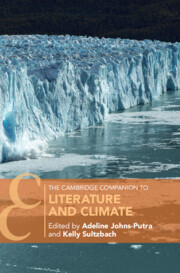Book contents
- The Cambridge Companion to Literature and Climate
- The Cambridge Companion to Literature and Climate
- Copyright page
- Contents
- Figures
- Notes on Contributors
- Introduction
- Part I Historical Shifts in Climate Consciousness
- Part II Current Issues in Climate Change Criticism
- Part III Ways of Telling Climate Stories
- 8 Climate Theatre
- 9 Digital Cli-Fi
- 10 Climate on Screen
- Part IV Dialogic Perspectives on Emerging Questions
- Selected Bibliography
- Index
- Cambridge Companions to …
9 - Digital Cli-Fi
Human Stories of Climate in Online and Social Media
from Part III - Ways of Telling Climate Stories
Published online by Cambridge University Press: 31 March 2022
- The Cambridge Companion to Literature and Climate
- The Cambridge Companion to Literature and Climate
- Copyright page
- Contents
- Figures
- Notes on Contributors
- Introduction
- Part I Historical Shifts in Climate Consciousness
- Part II Current Issues in Climate Change Criticism
- Part III Ways of Telling Climate Stories
- 8 Climate Theatre
- 9 Digital Cli-Fi
- 10 Climate on Screen
- Part IV Dialogic Perspectives on Emerging Questions
- Selected Bibliography
- Index
- Cambridge Companions to …
Summary
The contemporary ecological crisis is also a crisis of human perception, representation, and agency. We are required to make frenetic alterations of scale, adjusting our daily experiences, actions and lifestyles to ever-changing global and atmospheric patterns and impacts. Yet the polysemy of climate and its diffuse presence in our lives – as extreme weather event, day-to-day expectation, scientific data, or urgent socio-political issue – also makes it amenable to multi-media or transmedia dissemination. Analogously, digital media is itself characterised by movement across and between microscopic (tweets, data) and macroscopic levels – i.e. a digital sphere marked simultaneously by ‘infowhelm’ and the possibility of mass global, networked, and resistant communities. This exploratory survey ranges from the quotidian dimensions of digital and online media – how changes in climate are being recorded and registered in tweets, blogs, and citizen science – to deeper qualitative storytelling formats adapted from and sometimes in dialogue with old media. The latter include online self-published fiction, podcasting (e.g. the BBC audio drama Forest 404), and personal ‘climate stories’ and testimonies. Ultimately, this essay argues for the continued importance, and potential agency, of human-scale perspectives on micro- and macroscopic ecological complexities and for preserving distinct, often maligned human modes of narrative and storytelling.
Keywords
- Type
- Chapter
- Information
- The Cambridge Companion to Literature and Climate , pp. 146 - 161Publisher: Cambridge University PressPrint publication year: 2022

